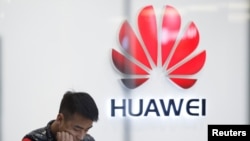The United States has launched a campaign against the Chinese telecommunications company Huawei Technologies.
The U.S. government wants to prevent Huawei from competing internationally in the launch of 5G mobile networking technology. 5G is the latest version of cellular technology. It is designed to increase the speed of wireless communications.
U.S. officials have accused Huawei of working with Chinese intelligence services. The company denies the accusation.
The U.S. effort has included officials from federal government agencies as well as President Donald Trump. The Trump administration has taken steps to contain Huawei’s ability to operate within the United States. It has begun an unusual effort to persuade U.S. allies to bar the company from operating on their soil.
Huawei has long been distrusted in some areas. The company has a documented history of industrial spying. Its competitiveness in the world has been helped by financial assistance from China’s government.
“Huawei has been accused of many things for a very long time. This is nothing new,” said Michael Murphree. He is with the University of South Carolina’s Darla Moore School of Business.
“What is unique is the extent of the pressure campaign,” Murphree added. For “international technology competition, this is certainly a very strong effort against a specific firm.”
The effort to stop Huawei from playing a major part in the launch of 5G comes while U.S. and Chinese officials are in talks to end a trade war. The United States began the trade war last year when it ordered tariffs on hundreds of billions of dollars’ worth of Chinese exports.
A spokesman for Huawei would not comment on the actions of the Trump Administration.
The case against Huawei
U.S. officials say they have many reasons to distrust Huawei.
Since 2017, China has had a National Intelligence law that gives government intelligence services the power to demand the cooperation of businesses operating in China. U.S. officials argue that this creates a threat to American national security.
“In America, we can’t even get Apple to…open an iPhone for the FBI,” Florida Senator Marco Rubio said earlier this month. “In China, Huawei has to give the Chinese anything they ask for.” He added, “They should not be in business in America.”
Huawei has strongly denied that it operates as part of Chinese intelligence. But two recent spying cases have involved people close to the company.
In January, the Polish government arrested a Huawei official on charges of spying for China. The company itself has not been charged in the case. Huawei announced that the employee had been dismissed.
The United States has one major concern about Huawei: the idea that the company could set up a secret way to gain entry to electronic devices. The equipment would enable the Chinese government to read sensitive communications. It might even give China power to suspend communications in another country.
Ren Zhengfei, is Huawei’s president and founder. He has said China’s government would never make that request and, if it did, he would say ‘no,’ he told the BBC. He added “we (would) lose all our business. I’m not going to take that risk.”
The public battle over Huawei's image
The U.S. government’s anti-Huawei campaign has developed on several fronts.
There are accusations against Huawei’s Chief Financial Officer, Meng Wanzhou. She is being held in Canada at the request of U.S. officials who say she violated American sanctions against Iran. The U.S. justice department wants her sent to New York to face legal action.
There are separate federal charges that accuse the company of stealing trade secrets. President Trump has suggested he might use the charges against Meng to influence the trade talks.
There have also been active efforts to persuade other countries to avoid business with Huawei.
Last month, Secretary of State Mike Pompeo gave a warning to U.S. allies. He said that if they use Huawei telecom equipment, they will lose access to some intelligence collected by the United States.
In addition, a law signed by President Trump last year bars the federal government from buying equipment from Huawei and a smaller Chinese telecom company, ZTE. Trump has additionally considered an executive order that would bar Huawei from taking part at all in U.S. 5G networks.
Huawei is fighting back. It took the United States to court earlier this month. The case claims the company was unfairly banned from U.S. government computer networks. The lawsuit is likely also partly aimed at improving Huawei's image at a time when the company is under attack.
The risk of pushback from China
Some U.S. allies are showing real resistance to the American demands. German Chancellor Angela Merkel's reaction to the U.S. was simply that Germans would be "defining our standards for ourselves," The New York Times reported.
Finally, there is always the possibility that China may take action against countries that follow the U.S. requests. And in China, that kind of action would likely have a lot of public support.
Many Chinese believe that Huawei is a great company that has done extraordinary things…and it is being unfairly treated, said Lester Ross of the U.S. law firm Wilmer Hale.
VOA’s Rob Garver reported this story. Susan Shand adapted it for VOA Learning English. George Grow was the editor.
Write to us in the Comments Section or on our Facebook page.
_______________________________________________________________
Words in This Story
unique - adj. very special or unusual
firm - n. a company or business
tariffs - n. a tax on goods that are imported or exported
FBI - n. The United States' Federal Bureau of Investigation
sanctions - n. an action that is taken or an order that is given to force a country to obey international laws by limiting or stopping trade with that country, by not allowing economic aid for that country
access - n. a way of getting near, at, or to something or someone
standard - n. a level of quality, achievement, etc., that is considered acceptable or desirable





